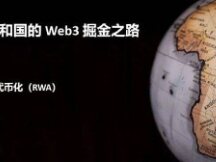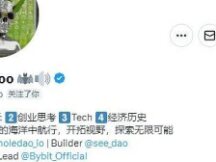Opportunities and challenges of blockchain and other technologies within the framework of the “Raural Revitalization” strategy
At the 2021 Shanghai International Blockchain Weekly Opening Day, Tu Wenhui, General Manager of Wanxiang Blockchain Technology Department, Zhou Jinjia, Senior Technical Specialist, China UnionPay Technology Department, Senior Researcher WeBank Fintech Li Bin, Li Junhua, vice president led by Jiangxi Bank Corporate Banking Department, the "Blockchain Empowering Rural Revitalization Theme Forum" discusses the opportunities and challenges of blockchain and other technologies under the "Rural Revitalization" strategy , and to support the sustainable development of "Blockchain Empowering Rural Revitalization". The development offers a point-to-point approach.
Here's a full transcript of the brief chat, including minor omissions that didn't affect the original mission.

Tu Wenhui (owner):Hello leaders, guests and friends online, good afternoon! My name is Tu Wenhui from the Blockchain Technology Department of Wanxiang Blockchain. We work on the integration of blockchain and new technologies such as Internet of Things, 5G and AI, and we can provide a wide range of end-to-end solutions. I am very happy to hold this meeting. Today we discuss the opportunities and challenges of blockchain and other technologies in our “Raural Revitalization” strategy. We are happy to invite industry experts from the frontlines of blockchain and rural support for discussions. First, a brief introduction to the key personalities and events of the company we work for, Mr. M. of Jiangxi Bank. Let's start with Li Junhua.
Lee Jun Hua :My name is Li Junhua from a joint venture of Jiangxi Bank. Jiangxi Bank is an urban enterprise established in 2015 by its CEO, Nanchang Bank. With the rapid development of China's economy, Jiangxi Bank has grown rapidly and is listed on the H market in 2018.
Tu Wenhui (owner):Mr. Thank you Li. Then Mr. Please tell Li Bin.
Lee Bin: My name is Li Bin, Senior Researcher at WeBank FinTech. He plays a key role in FinTech-related research on innovation and design, and has previously been involved in the development of domestic and industry-related blockchain and AI technologies. . Regarding digitalization, Woori Bank recently published a book titled "Decentralized Commerce: New Business Transformation in the Digital Age" which is somewhat influential in today's environment.
Opened in 2014, WeBank is the first digital bank to open in China and is an ideal place to provide financial services. As WeBank's name suggests, "Wei" means small business and "Zhong" means public. At the end of last year, WeBank served 270 million users and around 1.88 million small customers. By integrating all of the bank's core processes into a self-contained design solution, technology and applications can be deepened by focusing on four areas of Fintech ABCD, and more than 30 technologies are now open. The most representative of them is the FISCO BCOS open community, which has been formed by more than 2,000 companies and organizations and more than 40,000 community members, and has become the largest common and frequently used in the ecosystem. of the open integrated chain in Korea. .
Tu Wenhui (owner):Thank you sir. Li Bin. Next in line Mr. Tell us about Zhou Jinjia.
Zhou Jinia :Hello everyone! Thank you Wanxiang Blockchain Lab for inviting us, we are glad to join the discussion of the 7th Global Blockchain Conference Open House at the City Revitalization Conference to discuss and introduce the global payments experience with industry experts.
My name is Zhou Jinjia. I am part of China UnionPay trading company, now mainly responsible for opening a bank. China UnionPay has a board of directors that oversees the operations of 19 member banks and an open banking group of 17 banks. In addition to the task force dedicated to opening a bank, UnionPay presented "the needs to accelerate digital growth and create new advantages in the digital sector" as the "14th five-year plan", and the People's Financial Corporation of China "Rural Revitalization Demonstration "Construction Project Support" and Union Commercial Bank set up a special working group for rural support.
On October 21, 2021, China UnionPay presented two papers at a press conference held at the Chengfang Fintech Forum. One is “Research on Data Protection and Open Enforcement” and the other is “Fintech Research on Improving Urban Populations”. Tell us”, I hope to have the opportunity to tell you today.
Tu Wenhui (owner):Thanks for the presentation. Stay tuned for sharing. A report from the 19th National Congress of the Communist Party of China in October 2017 called for the first time to establish a strategy for dealing with rural populations. It promotes a strong integration of rural areas, next-generation information and agriculture and operations. "We invite guests to talk about supporting rural and digital cities. Let's start with Li, Chairman of Jiangxi Bank.
Lee Jun Hua :Jiangxi is a vast agricultural area, but many cities in China are still considered closed. Since it is affected by everything, such as construction, information technology, population availability and product flow, “samnon” and digitization are necessary to improve rural people, digitize human life and digitize farmers. 'Digitizing production and rural enterprises. Digitization can better open up the country and open the country to the outside world. It is a rural and open development. Now the population is declining because they cannot control the population in the rural areas.
living :In fact, the level of digitalization in the financial sector, consumer industry and many service industries has already been very high, but there is still a lot to be done to improve the level of digitalization in industry and business. 'Agriculture.
Personally, I think the concept of digitization has two meanings. The first step in the English language is digitization, which converts physical objects into digital form, like converting data into digital data. change in the world. In recent years, many industries have continued to digitize in layers. The second layer, called digitization, not only transforms the body into digital products, but also digitizes process control, decision-making processes, and business models. As an example of WeBank, our loans are shared by hundreds of thousands of features and hundreds of big data models, such as amount payable and amount payable. , without the approval of the account manager and the risk manager is determined by the decision based on information about interest rates and how each person should be liable for their debts.
Looking at rural support from the perspective of the bank, the current level of business-agricultural relations is low due to the data of the economy, the copy of which itself cannot be entirely digitized. In the future, if more agricultural products and characteristics, characteristics and benefits of the agricultural chain can be represented numerically in the model, banks can determine credit and insurance based on agricultural data instead to use credit history data for credit ratings. The distance between finance and agriculture is getting closer, and I think it's time for financial companies to improve in the future.
Tu Wenhui (owner):Thank you. Mr. Jin Jia, what do you think about supporting rural and digital cities?
Zhou Jinia :As an important part of digital China, digital city has always been highly valued. In April 2021, 7 departments and management including financial institutions of China jointly announced the "Notice on the Organization and Operation of Fintech Rural Revitalization". Demonstration Projects" and decided to use the technology in 9 demonstration sessions. Provinces and cities, including Jiangsu, Anhui and Fujian. UnionPay identified the definition and understanding of rural advocacy based on data, generally comprising the four following:
First, it promotes the integration of financial services. In order to particularly improve rural financial information, there is a need to support the development of new channel services that connect on/offline, between financial institutions, and between financial institutions and the public.
Second, increase the provision of financial services to the agricultural industry, strengthen the automatic collection and expertise of data and agricultural operations, and improve the standards of financial analysis and risk management to complete the application of the financial assistance in key areas. and agricultural links.
Third, focus on the integration of financial and human lifestyle, promote the development of humane, warm and uninterrupted public services, increase export mutual assistance in local financial assistance centers, and support the establishment of contacts. Improve payment platforms, improve the ability of rural people to deliver online services in their communities, and support rural public services such as security, health, transport and payment.
Fourth, establish a rural digital base and develop big data for agriculture and rural areas. Rural Financial Services Monitoring System rural loan information service platform facilitates the integration and use of agriculture information, service improvement and credit system implementation , and installs all the "three rural". Security of money and information.
These are the points we focus on in UnionPay's definition of "Report on Participation and Initiation of Fintech Demonstration Projects for Rural Revitalization" and the process of supporting rural support strategic plans. Thank you Lord!
Tu Wenhui (owner):Thank you for your teacher. After talking about Jinta, Jinta, practice, practice, practice, practice and discuss the development of rural areas.
Zhou Jinia :The incidence of recent outbreaks is particularly high. The role of variable capital banks has been increasingly in the process by which businesses provide safe, convenient and secure operations. Provides financial assistance to retailers across a wide range of clothing, food, housing and transportation Needs. We find that in addition to in-store services, commercial banks also prefer crowdsourced services. As a result, UnionPay has engaged extensively with businesses in an effort to help develop open banking applications.
We see a lot of issues with banks backing their open banking app.
First of all, most open source banking programs adopt the open API interface method. Deploying APIs involves increased risk and requires integrated, standardized, and secure communications to support this work.
Second, openness makes it easier to integrate the services of the bank and its differentiated partners, and how to choose the right service providers to avoid risks. Fate is also important in opening a bank.
The third is that there is currently no built-in modeling system. From the direct connection of the bank to the company to the open bank today, each bank changes on its own and has its own model, which leads to long-term alcohol consumption. - Evolution in the time. That's why we adhere to the British Open Banking Standard and hope to establish an external consortium to meet the needs of our customers with easy access to many funds, and facilitate joint ventures and small and medium banks. To get a fair job.
In addition, since participating organizations generally believe that UnionPay adheres to the payment network, the experience of its development can be an application to improve open source business. . .
In this context, UnionPay has launched a Public Business Advisory Committee within the Business Council. From June to present, the working group has 17 members and 128 members, and has formed 5 groups, mainly to study integration, secure access, universal access, data protection and market compliance open. , including new research. events.
Of course, the success of the cost of opening a bank must be conditional. In addition to the above models and research, UnionPay will work with banks to test the latest developments and use the UnionPay payment network to support businesses and open financial applications. Today, as UnionPay opens its enterprise network platform, financial management is complete. Moreover, many banks like Everbright and Ping An are preparing for the opening of the bank.
In addition to the Open Banking Working Group, we have partnered with 12 banks and units, including companies from the industrial, agricultural and construction sectors, to support the role of fintechs in the platform's rural financial markets. Together, develop workflows, design templates, explore the use of technology, and learn more about the viability of financial aid in rural areas.
Therefore, the bank has developed a plan for a demonstration of rural support, the first phase of the plan includes home equity loans for rural populations and small and medium enterprises (SMEs), loans for smart crops and. reduce the cost of agricultural equipment. Community banks that provide audio and video services, water, electricity and coal payments, insurance and other third-party services.
We are fortunate to have worked with Wanxiang Blockchain Lab on our Culture Life Project. This project relies on UnionPay to open a bank account to provide banks with a secure beef loan application. Through the open platform, UnionPay Huinong's general services receive certificates from technology partners, design and test the data structure, and then send them to businesses as a business based on the data for the evaluation of Mortgages.
UnionPay is also working with Huawei to work with other technology providers, including research on the use of remote satellite data and agricultural loans in open banking. In September this year, we went to Shandong province to support cattle loan and satellite data loan, and submit the approval, and greatly benefit from the management of economy, trade and banking .
The above is real knowledge. Thank you, guardian.
Tu Wenhui (owner):Thank you. Jin Jia, UnionPay has done a lot for rural development. I believe that Jiangxi Bank has a wide range of practices in various fields of agriculture, now Mr. So give us some examples. Then Mr. Li will update us on the current state of support for digitally-enabled rural and local practices.
Lee Jun Hua :The promotion of rural territories and the current situation of digital rural territories still lag behind the law of proclamation, and of course the dissemination of the law.
Second, growth considerations need to be refined. Many people learn or practice, but most of them are idea-based and do not include rural support based on local circumstances.
Third, the digitization and expansion of rural areas has already been achieved, and while some rural areas have been as successful as cities, most rural areas have not. It is inconsistent that most infrastructure in the early stages of digitization and information technology in rural areas is in the public interest and unprofitable, and business entry should be beneficial.
However, I think the prospects for supporting rural and digital cities are very broad. Starting everything is difficult and requires a process.
Now that everyone is jumping into the field of rural support, the blind will surely come out a lot of chicken wings. In my opinion, the project should not be blind, it should find a good job, because Jiangxi Bank advanced three points, such as Nanfeng Citrus, Ganzhou Navel Orange, etc. Jiangxi.. Gyeongdeokjin Ceramics, etc.
In addition, Jiangxi Bank is exploring ways to improve rural financial services in accordance with national legislation. Blockchain, for example, can be used to finance carbon and carbon sequestration to rehabilitate rural areas, with prior wind turbine approval. However, there are still many ways to support rural areas and it may not meet expectations, so the key is not to rush. Thank you all!
Tu Wenhui (owner):Actually, I would like to invite Li Bin, chairman of WeBank.
living :WeBank is mainly aimed at small and medium enterprises, and many of them are small farmers and farmers engaged in rural enterprises, and it can be said that they were involved in rural support. There are about two specialized ways, on the one hand, to work with key agricultural types to support valuable information on purchasing, manufacturing, sales, delivery and other connections to help upper and lower suppliers. On the other hand, it meets directly with small business owners and calculates risks based on information such as the exchange of tax information and records between them and the merchant, and provides small business loan services to small business owners with information without a loan or collateral. . .
Tu Wenhui (owner):Rural areas are complex areas with natural socio-economic characteristics, and as a national rural revitalization strategy is comprehensively and thoroughly implemented, the development of remote cities in Korea will experience a period of significant change and transformation over the years. next 5 to 5 years. 10 years. . At the same time, rural areas are the broadest and deepest base for us to achieve innovation, as well as the greatest potential and passion. inside.
Let's move on to the "Times" section of today's roundtable. I would like to invite all the guests to discuss the archive timeline, endorsements and the benefits of blockchain technology in the application of rural support. Personal feelings. Mr. Let's start with Li Bin.
living :Blockchain is the best tool for reliable communication, and it also provides an equal opportunity for innovation. First, past guests provided examples of agricultural traceability products and agricultural financial chains, which help reduce friction costs and the risk of fraud. With the industry now talking about "food change", it is believed that more and more locals will gradually become aware of the price of high-end and high-end agricultural products. Secondly, the reliability and trustworthiness of the different nodes in the blockchain network for agriculture still presents challenges. If an authorized and central body is reported as the administrator of the node, or the administrator is assigned to join the open and transparent affiliate chain, it will become one of the nodes that will build everyone's trust in technology blockchain. Finally, having ensured the reliability of the agricultural information system through the use of blockchain technology, financial companies can join it and use it as a convenient source of data to assess returns on loans and investments, and more opportunities for future commercial and financial integration.
Tu Wenhui (owner):After talking about blockchain's "exploring and exploration" status, Li Bin wanted to ask Jiangxi Bank Chairman Li to talk about it.
Lee Jun Hua :The use of technology must be able to meet the needs of consumers, and in any case, technology can only play a viable role. I think blockchain and rural support can be developed further in the following.
Our bots are tired. Please try later.
Second, the product is around.
Third, rural finance. Joint ventures and large banks rarely open branches in rural areas, and only banks, banks, and financial institutions (Postal Savings Bank, Agricultural Bank of China, and Rural Credit Cooperatives) have branches in some rural areas. Only by creating a comprehensive database based on the use of blockchain technology, the public can increase income more easily, so that a larger budget can be used for each farmer.
Fourth, carbon finance, "two mountains theory" and "two mountains theory" are very popular in rural areas. Carbon finance has two things to do first. One is the exchange rate and the other is the count. You can now measure your carbon monoxide. For example, all trucks that are parked and parked are tested as they enter the factory. Carbon emissions are very real and can also play an important role in government regulation.
Tu Wenhui (owner):Mr. Li supported us a lot. I believe blockchain offers great opportunities for inclusive carbon finance and financial inclusion. Time passed. Now blockchain technology is new. The use of new technologies will expose many problems and questions. I want to ask Mr. Jin Jia about your idea of a digital blockchain application. Using technology in rural areas, what is the biggest challenge?
Zhou Jinia :In fact, innovation is always a matter of time and challenge. The development of blockchain technology has always been successful, and with the advancement of technology, resources and technology have become more and more popular. On the other hand, a well-established security environment has developed and, on the other hand, how to see the reliability of technology and technology vendors is the topic of discussion. In particular, financial markets have high requirements for security and reliability, which they have met in the piloting process of UnionPay, so it is not a question of technology itself, but the problem of know how to know the platform.
Banks also raised questions about the accuracy of the information provided by the platform. It's a win-win situation, and UnionPay is still thinking about it, so we're doing rural advocacy and opening a bank at the same time. Open Banking hopes to build trust in the market through regulatory processes by establishing access to stakeholders when building an ecosystem, and maintaining the efficiency and capacity of stakeholders in the process and industry as needed.
If an open banking network platform as a blockchain security chain needs to be replaced, she believes she might be able to provide services such as debt investigations to cover industry lending risk. sees the future. He hopes that this collaboration will solve the current problems of using new technologies in the market and together lead to the long-term improvement of new technologies in rural development. Thank you host!
Tu Wenhui (owner):Thanks to Jinjia Moving on to the last question, please tell us briefly about the application and future development of new technologies such as blockchain, big data and AI for rural support. We also started with Li, Chairman of Jiangxi Bank.
Lee Jun Hua :From the atomic world to the earthly world, I believe that the revolution led by technology can only improve. About 20 years ago, an American expert wrote a book called "Digital Survival" and predicted that people in the future would live in the virtual world. Today, everything in our social life and life is inextricably linked with mobile phones, and in fact, the difference in the virtual world is quite different. If you want to do better rural support in the future, I think you need to think about "how to use the digital wave in detail and follow the real situation".
living :I want to talk about certain points of view.
First, in the future, we expect blockchain technology to realize a stable market in rural support situations.
Second, we hope that blockchain-based rural financial solutions will be further supported and promoted by governments and regulators.
Third, data is the most important resource in manufacturing. Today, the whole blockchain strategy in rural support is considered small, but if the interaction of integration can be achieved in the future, it will create a cross section and cross section. . . The harmonization of the industrial economy will lead to greater development.
Zhou Jinia :Let's talk about hope. We believe that UnionPay has partnered with technology companies such as WeBank, Jiangxi Bank and Wanxiang Blockchain, including several banks, to develop a technology appliance platform, promoting open banking, promoting the development of financial ecosystem and financial integration needs. Integrate smart devices, expand to rural consumers, expand to rural support events, and further integrate to improve services and support financial integration.
Tu Wenhui (owner):Thanks for the great sharing. It seems that everyone has confidence in the field of rural support. Today's discussion is over, thank you!

Scan QR code with WeChat































